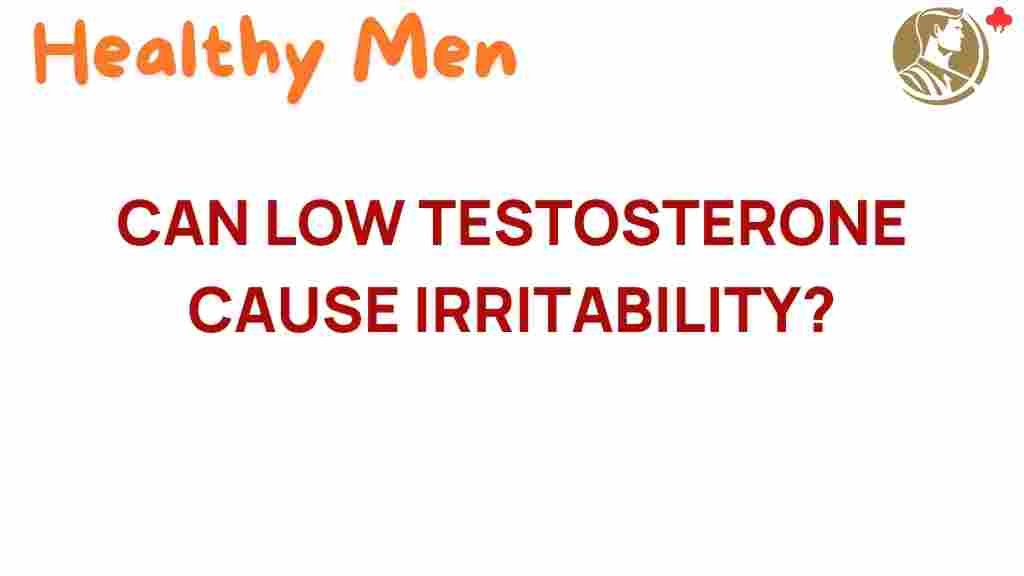Unraveling the Link Between Low Testosterone and Irritability
In recent years, there has been a growing awareness of how hormonal levels can impact not only physical health but also emotional well-being. Among the various hormones, testosterone plays a crucial role in men’s health. Low testosterone, also known as hypogonadism, has been linked to many psychological effects, including irritability and mood swings. Understanding this connection is essential for both men and their healthcare providers to address potential mental health issues stemming from hormonal imbalances.
The Role of Testosterone in Men’s Health
Testosterone is often referred to as the male hormone, although it is present in both men and women. In men, it is produced primarily in the testes and is responsible for the development of male characteristics, such as muscle mass, bone density, and facial hair. However, testosterone is also vital for emotional stability and mental health.
When testosterone levels are normal, men generally experience a healthy balance in their mood and emotional responses. However, when these levels drop, men can experience a range of issues, including:
- Decreased energy levels
- Increased body fat
- Loss of muscle mass
- Reduced sexual libido
- Irritability and mood swings
Understanding Low Testosterone and Irritability
Low testosterone can lead to significant psychological effects. One of the most common symptoms is irritability. Men experiencing low testosterone levels often find themselves more easily frustrated or agitated, which can lead to mood swings. These mood fluctuations can be perplexing and distressing, impacting relationships and overall quality of life.
Research indicates that testosterone levels can influence neurotransmitters in the brain, such as serotonin and dopamine, which are critical in regulating mood. A hormonal imbalance, particularly low testosterone, can disrupt this delicate balance, leading to heightened irritability and emotional instability.
Signs of Low Testosterone
Recognizing the signs of low testosterone is the first step in addressing the issue. Common symptoms include:
- Fatigue and decreased energy
- Difficulty concentrating or memory issues
- Increased irritability and mood swings
- Loss of interest in activities
- Depression or anxiety
- Changes in sleep patterns
If you or someone you know is experiencing these symptoms, it may be time to consult a healthcare provider to evaluate testosterone levels. Early intervention can play a crucial role in managing the psychological effects associated with low testosterone.
The Connection Between Hormonal Imbalance and Mental Health
Low testosterone is not just a physical health issue; it significantly impacts mental health. The relationship between hormonal imbalance and emotional well-being is complex. Studies show that men with low testosterone levels are at an increased risk of developing mood disorders, including depression and anxiety.
Psychological effects stemming from low testosterone can manifest in various ways:
- Increased irritability
- Heightened stress response
- Lower self-esteem and confidence
- Social withdrawal and isolation
Addressing low testosterone is crucial not only for physical health but also for maintaining emotional stability and improving overall quality of life.
Testosterone Therapy: A Solution for Irritability
For men diagnosed with low testosterone, testosterone therapy can be an effective treatment option. This therapy aims to restore testosterone levels to a normal range, which can alleviate many symptoms, including irritability and mood swings.
There are several forms of testosterone therapy available:
- Injections
- Patches
- Gels
- Pellets
Each method has its benefits and potential side effects, so it’s essential to discuss options with a healthcare provider to determine the best course of action for individual needs.
Steps to Address Low Testosterone and Emotional Well-being
Addressing low testosterone and its effects on irritability involves several steps:
- Consult a Healthcare Provider: If you suspect low testosterone, seek medical advice for a proper diagnosis and treatment plan.
- Get Tested: Blood tests will help determine testosterone levels and assess the need for therapy.
- Consider Lifestyle Changes: Regular exercise, a healthy diet, and adequate sleep can positively influence testosterone levels and overall mood.
- Engage in Stress Management: Techniques such as mindfulness, meditation, or yoga can help manage irritability and improve emotional well-being.
- Follow Treatment Recommendations: If testosterone therapy is recommended, adhere to the treatment plan and follow up with your healthcare provider regularly.
Troubleshooting Tips for Managing Irritability
In addition to medical treatment, there are several strategies that can help manage irritability and mood swings:
- Practice Mindfulness: Engage in mindfulness practices to help stay present and reduce stress.
- Stay Active: Regular physical activity can boost mood and energy levels.
- Maintain Social Connections: Spending time with friends and loved ones can provide emotional support and reduce feelings of isolation.
- Limit Alcohol and Caffeine: Both substances can exacerbate anxiety and irritability.
- Seek Professional Help: If irritability persists, consider speaking with a mental health professional for guidance and support.
Conclusion
Understanding the link between low testosterone and irritability is crucial for men’s health and emotional well-being. Low testosterone can lead to significant mood swings and irritability, affecting not only the individual but also their relationships and overall quality of life. By recognizing the signs of low testosterone and seeking appropriate treatment, including testosterone therapy, men can reclaim control over their emotional health.
Ultimately, addressing low testosterone involves a multifaceted approach, including lifestyle changes, stress management, and professional support. If you or someone you know is struggling with the psychological effects of hormonal imbalance, don’t hesitate to reach out for help. For further information on men’s health and hormonal balance, check out this resource.
By prioritizing mental health alongside physical health, men can achieve a better quality of life and emotional stability.
This article is in the category Conditions and created by healthymen Team
